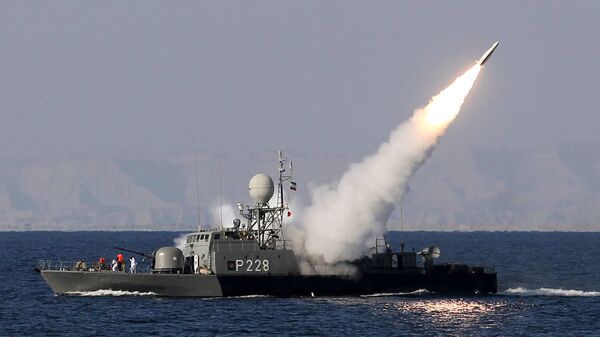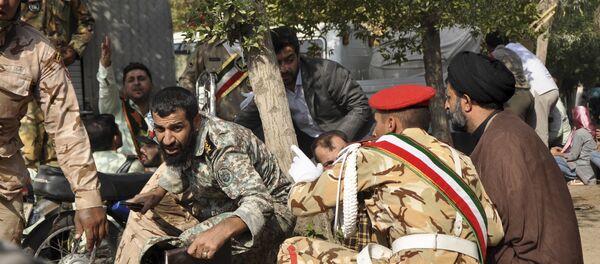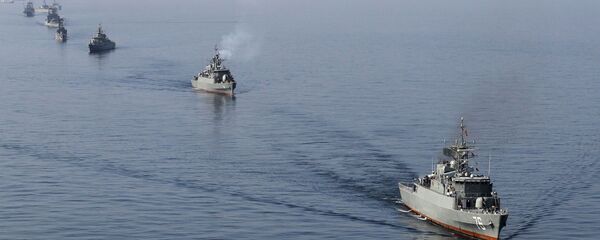The White House announced Sunday that the US Navy's aircraft carrier USS Abraham Lincoln would deploy to the Persian Gulf region with a battle group as well as an unspecified bomber task force to address "troubling and escalating indications and warnings" from Iran.
US National Security Adviser John Bolton said Sunday the deployment was meant to send "a clear and unmistakable message to the Iranian regime that any attack on US interests or those of our allies would be met with unrelenting force."
"It is absolutely the case that we've seen escalatory action from the Iranians, and it is equally the case that we will hold the Iranians accountable for attacks on American interests," US Secretary of State Mike Pompeo said. "The fact that those actions take place, if they do, by some third-party proxy, whether that's a Shia militia group or the Houthis or Hezbollah, we will hold the Iranians — Iranian leadership — directly accountable for that."
However, Mohammad Marandi, an expert on American studies and postcolonial literature who teaches at the University of Tehran, told Radio Sputnik's Loud and Clear Monday the move was "mostly psychological warfare."
"When the United States brings in aircraft carriers and other such military hardware or ships into the Persian Gulf region, that basically means that there won't be a conflict, because the Persian Gulf is very small," Marandi noted.
"The Iranians have been, since the Iraq invasion [by the US in 2003], they've been preparing the Persian Gulf region for a potential war. They have underground cities and missile defense capabilities across the Persian Gulf and the Indian Ocean, and US naval ships are very close to the Iranian naval waters and the Iranian border and Iranian land, so they would be very vulnerable to Iranian missiles," Marandi said. "So if the US really wanted to threaten Iran, the first thing that they would do is they would move their assets out of the Persian Gulf region."
"The United States knows that if there is real conflict, the shutting of the Strait of Hormuz would only be a sideshow. The truth of the matter is that everything in the Persian Gulf will be destroyed: the oil installations, the gas installations, the tankers in the Indian Ocean. There won't be any oil or any means to export that oil, and that would lead to a global economic depression, I think, unseen in the last century," Marandi said, comparing the result to the Mutually Assured Destruction theory that kept nuclear powers from attacking each other in the Cold War.
"No one would win; everyone would lose," Marandi told hosts John Kiriakou and Walter Smolarek.
"Iran doesn't want war," Marandi noted, but "Iran has prepared for war for the last two decades to make sure war doesn't happen."
The professor predicted that in the event of a war, US power would encounter trouble in the whole region, including in Syria, Iraq and Afghanistan, the latter two of which border Iran. "But I think the most important element of all would be the fact that 17 to 18 million barrels of oil a day, as well as huge gas exports from the region, will immediately come to an end."
"The feeling in Tehran is that there's not going to be a war, because serious people in the United States are not mad. The people in the military and the CIA and intelligence, they know Iran's capabilities," Marandi said, noting that Iran has advanced its missile and naval capabilities significantly for the last 20 years with the specific intention of confronting and endangering the Fifth US Fleet, which is headquartered on the island of Bahrain on the Saudi side of the Persian Gulf. Likewise, Iran's missile defense industry is high-tech and well-developed.
"The consequences would be extraordinarily painful for the United States, and the world would blame the United States as well for creating the situation," Marandi said.
Marandi said the deployment of the aircraft carrier was mostly a political ploy by US President Donald Trump to try and curry favor among interested parties in the US, such as wealthy Republican donors like Sheldon Adelson, but also pro-Likud Zionists who despise Iran, to build support for his 2020 reelection bid.
However, the professor wouldn't dismiss the possibility that Bolton or Pompeo were "that foolish."
Any war with Iran would "depend on the US being able to preserve the oil trade, and I don't see that happening at all. Iran's allies in Iraq would probably themselves end the export of Iraqi oil — that would be in addition to the oil that leaves the Persian Gulf. All the oil installations are right inside the Persian Gulf or alongside the coast."
"Saudi Arabia, if it has just one day of war, if its installations are targeted, the whole country will fall apart. Saudi Arabia and the United Arab Emirates are not real countries," he said. "They're not France, or Iraq, or Egypt or Brazil. These are based on two dictators: [Saudi Crown Prince] Mohammed bin Salman and [Crown Prince of Abu Dhabi] Mohammed bin Zayed, and any instability would bring down these regimes."





